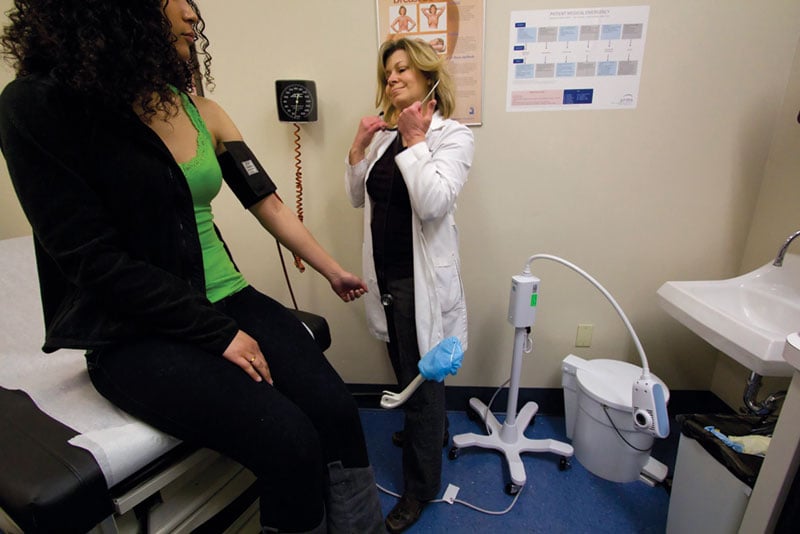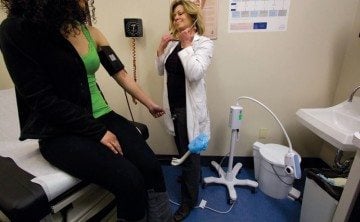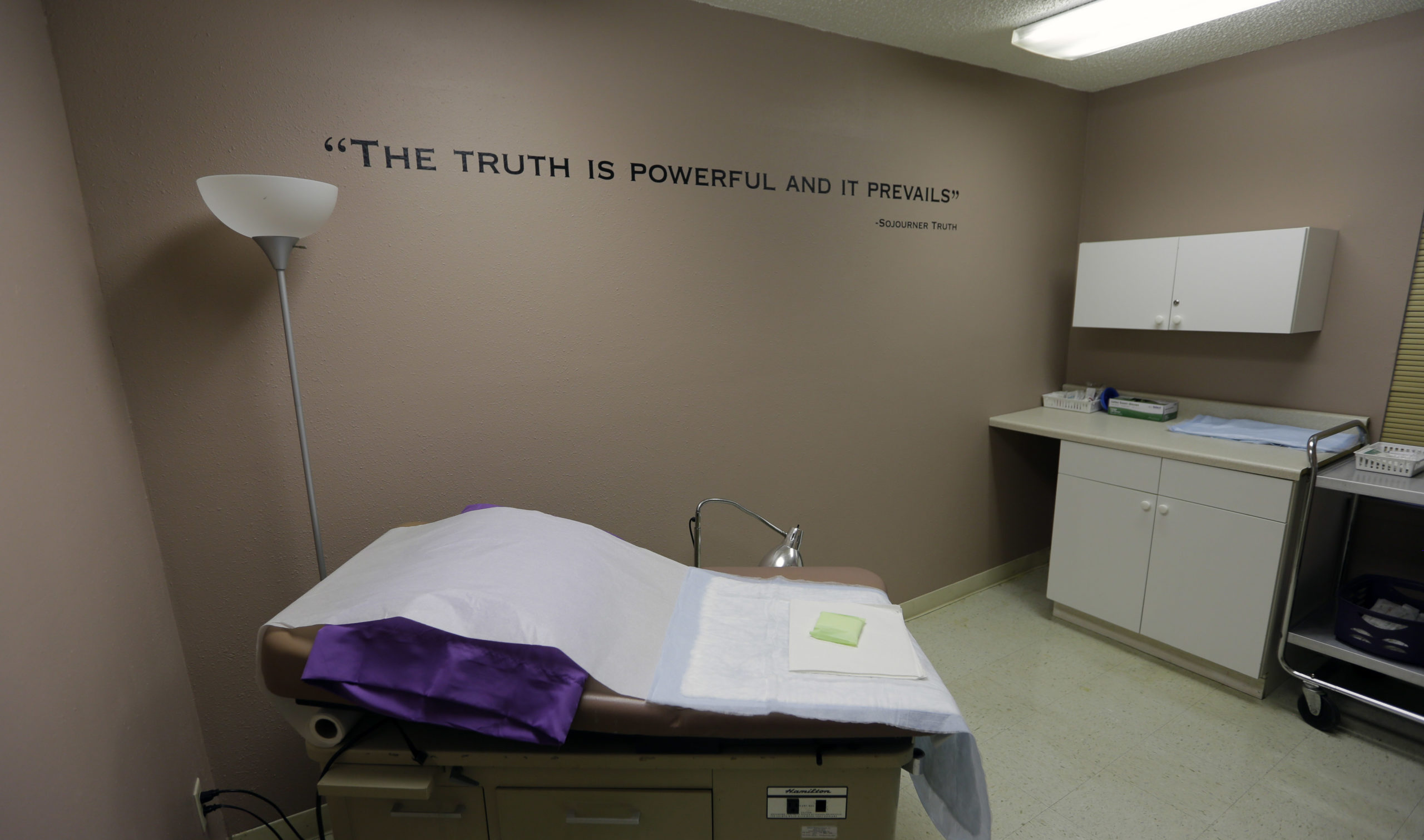
Texas to Cut Off Remaining Medicaid Funds for Thousands of Planned Parenthood Clients


Planned Parenthood has 30 days to respond to the state health department before Texas eliminates the health care provider from the joint federal-state Medicaid program, a move that will almost certainly lead to a messy legal battle as conservative state officials continue to take swings at the reproductive health care provider.
The Office of the Inspector General at the Texas Health and Human Services Commission (HHSC) sent a letter to a Houston Planned Parenthood affiliate on Monday, writing that the state has determined the organization’s Texas affiliates do not provide medical care in a “professionally competent, safe, legal and ethical manner.”
As outlined in a letter from inspector general Stuart Bowen, the decision appears to be based on a series of secretly filmed, deceptively edited videos released this summer by the anti-abortion group Center for Medical Progress (CMP), which says its videos show Planned Parenthood illegally profiting off of fetal tissue donations. In one of the videos, CMP anti-abortion activists pose as tissue procurement professionals attempting, unsuccessfully, to purchase tissue from Planned Parenthood Gulf Coast (PPGC) in Houston. Planned Parenthood has said that it has not participated in fetal tissue donation in Texas since a 2010 partnership with the University of Texas Medical Branch.
In the letter, Bowen writes that “earlier this year, [Planned Parenthood] committed and condoned numerous acts of misconduct captured on video that reveal repeated program violations and breach the minimum standards of care required of a Medicaid enrollee.”
As yet, no Texas Planned Parenthood affiliates or employees have been officially charged with any criminal or civil violations as a result of still-ongoing state investigations into the provider’s fetal tissue donation practices. The Texas Attorney General’s Office, in a statement issued Monday afternoon, said that the CMP video footage “suggests multiple statutory and program violations” and “raises serious concerns” about Planned Parenthood’s standards of care.
Nevertheless, Bowen’s letter goes on to list the health care provider’s alleged Medicaid violations, concluding that Planned Parenthood has “a policy of agreeing to procure fetal tissue even if it means altering the timing or method of an abortion,” has failed to “prevent conditions that would allow the spread of infectious diseases among employees, as well as patients and the general public,” and has improperly trained its staff. Bowen also writes that the Office of the Inspector General has information concerning alleged Medicaid fraud and other violations.
Governor Greg Abbott praised the letter, saying in a statement that “Texas has stepped forward and shown its unyielding commitment to both protecting life and providing women’s health services.”
In a statement released Monday afternoon, Planned Parenthood Gulf Coast called the decision politically motivated: “Now Texas politicians are using a thoroughly discredited, bogus attacks against Planned Parenthood as a shameful excuse to attack Texas women’s health yet again,” PPGC spokesperson Rochelle Tafolla said.
The Texas HHSC letter came the same day that a Louisiana federal judge ruled that that state must continue to facilitate Planned Parenthood’s Medicaid funding while a challenge to a Planned Parenthood Medicaid ban there winds its way through the courts. A similar lawsuit is almost inevitable in Texas; Planned Parenthood affiliates have successfully challenged other state-backed attempts at federal Medicaid exclusions elsewhere.
According to Planned Parenthood, the state’s three affiliates — Planned Parenthood South Texas, Planned Parenthood Gulf Coast and Planned Parenthood Greater Texas — served approximately 13,000 federal Medicaid patients in Texas last year.
“The state cannot kick a provider out of Medicaid, or discriminate against providers in Medicaid, because they don’t like the services they provide or anything that’s not related to their license or enrollment as a Medicaid provider,” Pogue said.
If Texas’ Planned Parenthood affiliates challenge the state’s decision in court, the legal questions here could mirror those in other similar cases. For example: are the alleged violations listed in the inspector general’s letter enough to warrant the state booting the provider from Medicaid? Further, are the CMP videos — the veracity of which rests entirely on the word of anti-abortion activists acting outside the purview of state or federal law enforcement entities — evidence of wrongdoing?
Texas is conducting its own investigations into Planned Parenthood’s fetal tissue donation protocol, but hasn’t yet released the results. Similar investigations in other states have produced no evidence of illegal activity. Last week, Planned Parenthood Federation of America President Cecile Richards announced the organization would stop accepting reimbursement for fetal tissue donation costs, even though that reimbursement is allowed under the law.
Policy experts likened today’s announcement to Texas’ decision to kick Planned Parenthood out of the Medicaid Women’s Health Program in 2012. In response, the federal government pulled its matching funds because it found the state to be in violation of the federal Social Securities Act, which guarantees Medicaid patients the right to access health care from any qualified provider, even an abortion provider or an affiliate of an abortion provider. The state rebuilt the program without federal funds and launched the new program as the Texas Women’s Health Program (TWHP) in 2013.
This latest attempt at defunding Planned Parenthood could mean reduced access to family planning and other reproductive health services for the low-income Texans who rely on public funds for care.
In Texas, which has some of the strictest eligibility requirements for Medicaid participation in the country, Medicaid primarily serves pregnant women, and very poor children and seniors. But, if a patient is living at up to 15 percent of the federal poverty line, is not pregnant, and has at least one child already, she may receive family planning services covered by the program. A postpartum patient may also receive Medicaid-funded family planning services within 60 days of delivery. The program also covers poor teenagers.
According to Planned Parenthood, the state’s three affiliates — Planned Parenthood South Texas, Planned Parenthood Gulf Coast and Planned Parenthood Greater Texas — served approximately 13,000 federal Medicaid patients in Texas last year. In 2014, the organization received about $3 million in Medicaid funding for contraceptive services and pregnancy tests, but if the organization were to be eliminated, it would not be able to bill Medicaid for those types of services. It’s unclear what this would mean for Medicaid patients that show up to Planned Parenthood health centers: whether the organization would continue serving Medicaid patients but charge sliding scale fees, or potentially refer patients to another Medicaid provider.
Planned Parenthood Texas affiliates have not yet released any information concerning filing an official lawsuit in response to this defunding attempt.
Monday’s announcement is the latest in a series of efforts, spearheaded by Republican state officials, lawmakers and lobby groups opposed to abortion, that Texas has made targeting Planned Parenthood’s participation in publicly supported reproductive health programs. Earlier this year, the Legislature eliminated the health care provider from the Breast and Cervical Cancer Services program. And, as the Texas Tribune reported last week, the health commission has also prohibited Planned Parenthood from applying for abstinence education funds.
In his letter, Bowen points to the state Medicaid Women’s Health Program replacement, the TWHP, as well as “thousands of alternative providers in Texas, including federally qualified health centers, Medicaid-certified rural health clinics, and other health providers,” as evidence that the termination of Planned Parenthood won’t affect access to services.
However, despite lawmakers’ insistence that enough providers are available and ready to serve low-income Texans who need contraception and cancer screenings, studies have shown that enrollment in TWHP has dropped since the Texas Legislature banned Planned Parenthood from participating. According to one HHSC report, the program served thousands fewer clients after Planned Parenthood was kicked out.
Recent research has shown that more than half of Texas women who access publicly funded reproductive health care in Texas encounter challenges along the way. According to the Texas Policy Evaluation Project at the University of Texas at Austin, 55 percent of women accessing reproductive health services encounter at least one barrier along the way. Currently, Texas is only serving three out 10 patients who qualify for publicly-funded family planning services. If the state blocks — or, as it did with the Texas Women’s Health Program, loses — even more federal funds for low-income Texans who need reproductive health care, the number of Texans accessing services may drop even further.


